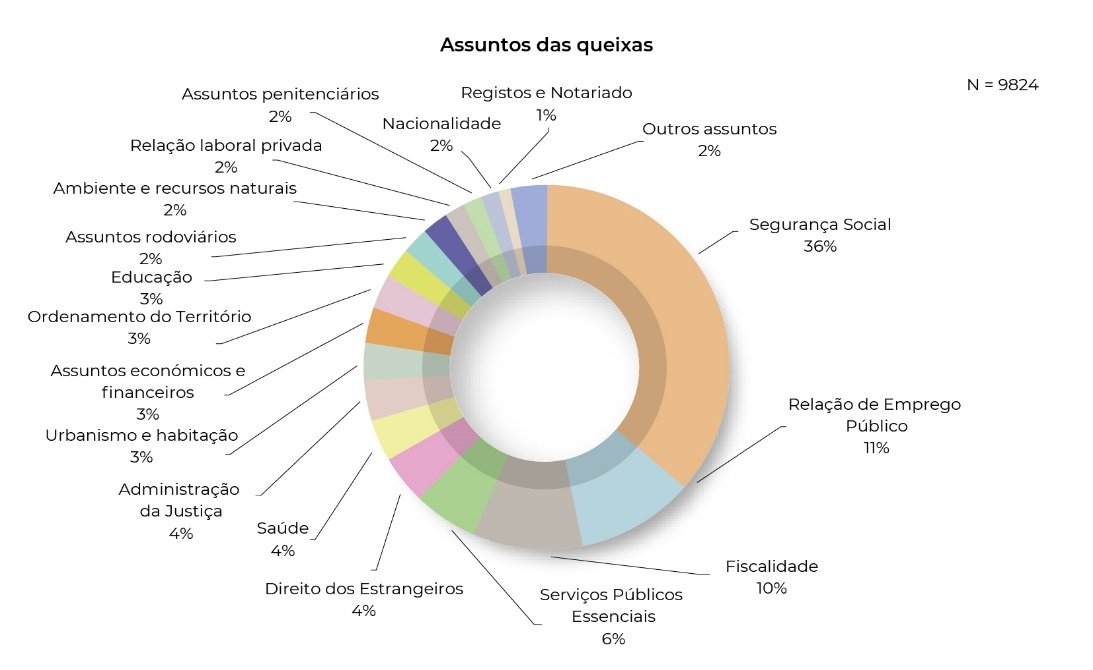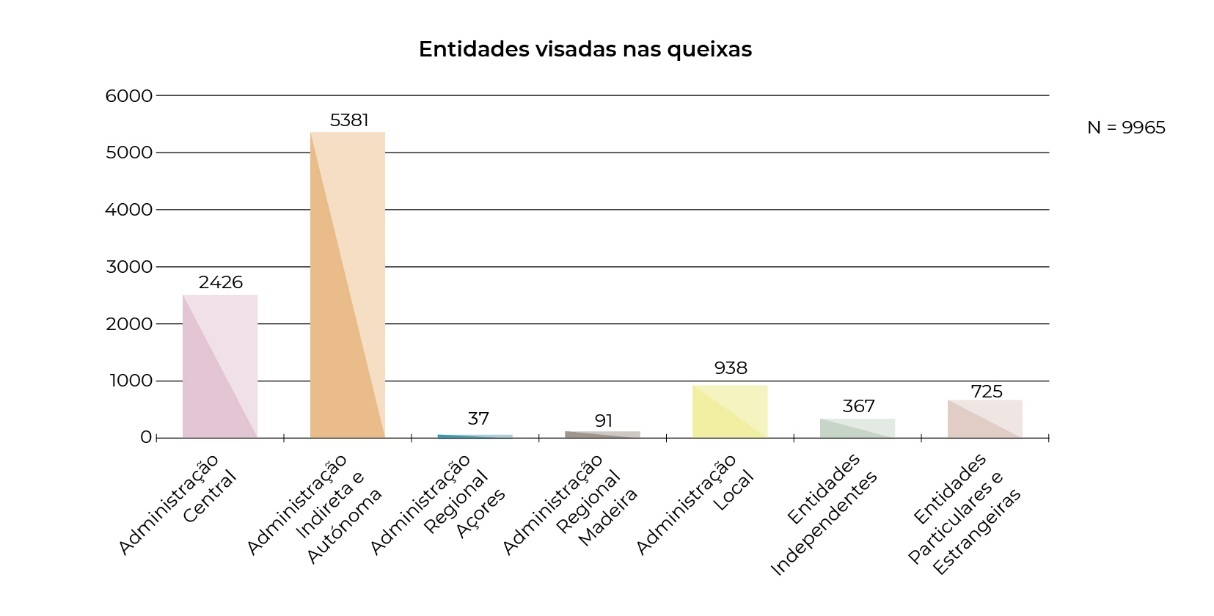Report 2019: More than 51,000 requests and 9,800 new instructed processes. Social Security complaints rise again. Conditions of detention continue to worry
In 2019, the Ombudsman received 51,313 requests through the various channels available to citizens (6.6% more than in 2018), and 9823 complaint procedures were opened, representing an increase of 5% in relation to 2018. Compared with 2017, the growth in new complaint procedures is 26%; taking 2016 as a reference, the increase is 42%.
In 2019, therefore, the activity indicators returned to be the highest in the history of this independent state body, created in 1975 to defend people who feel harmed by unjust or illegal acts of the administration or other public powers or who see their fundamental rights violated.
These data are included in the Report to the Assembly of the Republic – 2019, delivered today, accompanied by the annual report on the activity developed by the Ombudsman as a National Mechanism for the Prevention of Torture.
Breakdown of complaints by topic(i)

In terms of the most addressed themes, Social Security complaints once again dominated, which in 2019 represented 36% of the total number of complaints processed, after an increase of 21%, followed by increases of 39% and 37% in 2018 and 2017 respectively. Compared with 2016, the number of complaint procedures on issues related to social protection schemes more than doubled, with complaints on delays in pension processing and payment continuing to stand out in 2019.

Also as in previous years, the second most dealt with subject refers to Public Employment Relations (11% of the total complaints investigated), followed by Taxation (10%). These three Complaints increased throughout 2019, targeting entities registered with the Indirect and Autonomous Administration, targets of 54% of the total cases, with emphasis once again on the Social Security Institute. The number of complaints addressed to entities belonging to the Central Administration decreased their relative weight in relation to 2018, from 27% to 24%.
Special hot-lines
Throughout 2019, face-to-face or telephone assistance was provided in 10,813 situations, to which the activity of the Nucleus of the Child, the Elderly and the Citizen with Disabilities was added. This Nucleus, N-CID, which comprises three telephone lines, nationwide and free of charge, dedicated to the personalised attention of the most vulnerable population, received a total of 4108 telephone calls, 5.7% more than in the previous year. The most significant increase, of 7.4%, was observed in the calls received by the Senior Citizen Line.
National Human Rights Institution
In Portugal, the Ombudsman is also a National Human Rights Institution, and is responsible for promoting and defending human rights and ensuring that the Portuguese State complies with the international conventions that it has signed in this field. In 2019, the Ombudsman received Michelle Bachelet, United Nations High Commissioner for Human Rights, and presented, in this capacity, alternative reports to the international bodies of the United Nations on respect for the rights of the child, on torture and inhuman and degrading treatment, and also on the implementation of the International Covenant on Civil and Political Rights. The Ombudsman was also heard by the Committee on the Rights of the Child, the Committee against Torture, and the Universal Periodic Review mechanism.
National Prevention Mechanism
Within the scope of the activity of the Ombudsman as the National Mechanism for the Prevention of Torture and Degrading Treatment (MNP), which completed six years of existence in 2019, re-evaluation of the country’s prison establishments was practically concluded. Some visits were also made to police detention sites. In total, in 2019, the MNP visited 45 places of detention without prior notice, three more than in 2018, and also increased the average duration of visits. A protocol was also signed with the Ordem dos Médicos (Medical Association) which allowed monitoring of psychiatric clinics within the prison system to begin.
Recommendations
The Ombudsman addresses to the competent bodies any calls for attention, suggestions and, finally, any recommendations she considers necessary to prevent and remedy injustices. During the year, the Ombudsman addressed three recommendations. In one case, that of the recommendation to amend Law no. 32/2008 on the retention of data generated or processed in the context of the provision of communications services, the Constitutional Court was subsequently requested to abstractly review the constitutionality of articles 4, 6 and 9. As the National Mechanism for the Prevention of Torture, two other recommendations were addressed on Temporary Installation Centres and Equipped Spaces and on mental health care and contacts with the outside in Educational Centres.
Indemnities – Major fires in 2017 and collapse of the Road in Borba
The extraordinary competence attributed to the Ombudsman’s Office by the Council of Ministers, within the framework of the compensation process for the relatives of the victims of the fires of June and October 2017, mobilized the services of the Ombudsman’s Office intensively throughout 2018, but also in 2019. In relation to the fatal victims, the compensation process for family members and heirs was concluded at the end of the summer of 2018, after 300 applications for compensation were admitted in relation to 115 deaths, with the total amount of compensation proposed by the Ombudsman being around 31 million euros.
The process of compensation for the seriously wounded in the fires, which began in March 2018, is also practically complete. A total of 187 requests for compensation were admitted and sent to the National Institute of Legal Medicine and Forensic Sciences, which qualified 75 people as "seriously injured", and at the time of presentation of this report the proposal for compensation was not completed in a single case (which has already received interim compensation). In total, the Ombudsman’s decisions on the compensation to be paid by the State to these 75 seriously injured people amount to approximately EUR 11 million.
The process of compensation for the relatives and heirs of the five fatal victims of the collapse of Municipal Road 255, which occurred in Borba on 19 November 2018, was fully concluded in June 2019. Nineteen applicants filed claims for compensation, all of whom accepted the proposals presented by the Ombudsman. In total, the compensation paid by the State is around 1.6 million euros.
———- # ———-
"The action of the employer state, the insurance state and the tax state cannot continue to consume almost two thirds of all the Ombudsman’s activity. The excessive thematic concentration of the Ombudsman’s activity around the same three areas that have always concurred in the essentials of his intervention, if it is to be maintained, will prevent the institution from continuing to be what it should be: a reliable reflection of the changing social landscape and, therefore, an effective instrument of communication between the State and society".
Maria Lúcia Amaral, The Ombudsperson

